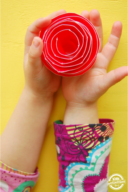Let’s explore air pressure with kids with these fun and easy science experiments that work for kids of all ages, even toddlers and preschoolers. Here are two air pressure experiments that are super simple, use items from around the house and are a great way to play with science at home or in the classroom.

Explaining the concept of air pressure to preschoolers can be tricky. It can sometimes be difficult for them to grasp the idea that spaces are filled with air, and that air can have force and move objects.
Related: Simple Machines for Kids
Air pressure is the weight of air molecules pressing down on the Earth. The pressure of the air molecules changes as you move upward from sea level into the atmosphere. The highest pressure is at sea level where the density of the air molecules is the greatest.
–Kids Fun Science, What is Air Pressure
Air Pressure Experiments for Kids
These simple air pressure experiments are great way to offer kids a visual demonstration of these concepts. They can feel the air on their skin and see it moving objects. It is also a lot of fun!
Air Pressure Experiment 1: Force and Pressure Experiment
In the first of our air pressure experiments for kids we will be investigating force and pressure and how that relates to air pressure. It is an easy way to demonstrate air pressure. Using simple things from around the house like a sponge and straw, they will be able to physically propel an object with just air!
Air Pressure Experiment 2: Water Bottle Air Pressure Experiment
In the second of our air pressure experiments, kids will see how air pressure can be used in a water bottle in the most unexpected way. They will be able to control actions inside the water based on the air pressure. This experiment uses a soda bottle.
This article contains affiliate links.

Force and Pressure Experiment
This air pressure activity is so simple to set up.
Supplies Needed
- 2 Kitchen sponges
- Drinking straw
- Plastic bag that zips like a Ziploc bag
- Pom poms, toy cars and anything else that they might want to move
Instructions for Simple Air Pressure Experiment
- Simply place the two kitchen sponges, one on top of the other, inside the plastic zip lock bag.
- Place the drinking straw between the two sponges so that one end of the straw is inside the bag and the other end is sitting outside the bag.
- Seal up the bag.
- In addition to closing the zip lock seal on the bag, you will also need to seal it with adhesive tape. The tape is not showing in the photo above. We first tested it out by just closing the zip seal but the bag burst open during the experiment. So, seal up your bag with adhesive tape and then you are ready to play!
- Blow into the straw to inflate the bag.

Ziploc Bag Experiment that Moves Items
6. Now place a pom pom on a flat surface and place the bag behind them so that the straw is positioned to blow the pom pom.
7. Press down hard on the sponges and watch the pom pom roll away!
Our Experience with this Science Activity
My son decided he wanted the pom pom to be moved with much greater momentum so he blew air into the straw, filling up the bag as much as he could. He then gave it another try and the pom pom really flew off the table this time around. He loved experimenting with low pressure and high pressure moments.

Car Ziploc Bag Experiment
Here are some simple ways to vary the air pressure activity for more hands-on science learning:
- Try holding the bag at different angles. How does this affect the pom pom?
- It would be fun to turn this into a game of air-soccer.
- Simply lay a container (eg a tin can, a paper cup or an empty tin can) on its side and try to shoot the pom pom into the goal.
- We also tried to move other objects such as toy cars and LEGO mini figures. Some of them moved and others didn’t.
- Our favorite was definitely the car ziploc bag combination! It was really cool to see a Hot Wheels car speed across the table only powered by air pressure.

Air Pressure Experiment #1 Results
Try to make predictions about what you think will be moved and then test your theories.
Can you think why some objects are moved by the air and others aren’t?
Have kids record what happens. Younger kids like preschoolers can make drawings of their predictions and then results. Older kids can write out what they think will happen and then what did.
That was fun! Let’s go on to the next of our air pressure experiments…

Water Bottle Air Pressure Experiment
Since air pressure is a big concept for preschoolers to understand, this fun and simple science experiment is a great hands-on demonstration of air pressure.
Kids love watching the straw dancing and bobbing around in the water bottle and it’s a great activity for strengthening hand muscles as they squeeze the bottle as hard as they can, to move the straw up and down.
You likely have everything you already need at the house.
Supplies Needed
- An empty soda or water bottle with the label removed (you need to be able to see inside!)
- A small amount of play dough, plasticine or clay
- A straw
- Water

How To Demonstrate Air Pressure To Kids with a Water Bottle
This air pressure activity is easy to do. Here are the steps to the second of our air pressure experiments:
- Cut a small length of straw
- Plug one end of the straw with the play dough
- On the opposite end of the straw, make a ring of play dough around the outside of the straw (so the straw is weighted but is open at that end)
- Fill the bottle three quarters full with water
- Drop the straw into the mouth of the bottle and screw on the lid
- Now to the fun part…

Squeeze the bottle as hard as you can and watch what happens……

The straw will sink!
TIP: If your straw is not sinking try squeezing the bottle at the top where there is no water. Also try lifting the bottle off the table when you squeeze.
Air Pressure Experiment #2 Results
So what is air pressure and what’s actually happening in the bottle?
- When you drop the straw into the bottle, the air inside it makes it float. When you squeeze the bottle, the space inside is compressed, that is, there is less space for the air to circulate so the pressure inside the bottle increases.
- The increased air pressure pushes water up into the straw, making it heavier, so it sinks.
- When you release the pressure on the bottle, the air pressure decreases (ie the air has more space to move around) so the air fills the straw again and the straw floats back to the top of the bottle.

Air Pressure Experiments Questions Answered…
1. What is an example of air pressure?
Anytime force is exerted onto a surface by air is an example of air pressure. One that we see everyday (and may not even think about it) is the tires on our car. The car tires are filled with air that cannot escape. The weight of the car pushes on the air in the tires and the air “pushes” back.
2. What is the principle of air pressure?
Bernoulli’s principle stats that an increase in the speed of a fluid occurs simultaneously with a decrease in pressure or a decrease in the fluid’s potential energy.
Air is fluid. It flows and can change shape.
3. What is the earth’s atmospheric pressure?
The standard, or near-average, atmospheric pressure at sea level on the Earth is 1013 millibars, or 760 millimeters of mercury. I liked the way this article at National Geographic explained it.
4. Is humidity related to air pressure?
Yes because air that is humid is much lighter and has less weight to press down resulting in lower pressure.
5. What does air pressure mean for kids?
Even though it might not feel like it, air has weight and presses in on anything it touches. These are the forces that we are talking about. Anytime force is exerted onto a surface by air is an example of air pressure. Another example is the pressure the weight of an air molecule exerts pressing down on the earth. This is a big component of weather, sea level and atmospheric pressure.
More Science Experiment Fun from Kids Activities Blog
- We have a whole bunch of fun science experiments for kids!
- These Halloween science experiments are scary fun year round!
- Have you read our book on cool science experiments?
- Let’s make a lemon battery.
- These fun science projects for kids are easy and keep kids curious.
- This baking soda and vinegar experiment is part art.
- Candy corn experiment is tasty fun!
- Science fair project ideas for kids of all ages.
- Make an electromagnetic train
- Let’s learn the heart!
- And don’t miss this really fun list of science activities for preschool.
- Check out what happens when you put marshmallow in a vacuum!
- You can make your very own catapults!
- Check out our list of 20 hands on activities for kids!
- Learn about and how to make pulleys!
- Try building your own atom model!
- Make muscles with balloons with this experiment!
- Print our simple scientific method worksheet for kids
- Balloon static electricity experiment for kids
- Easy science fair projects: experiment with salt!
- Let’s play science games
- Learn how to make a catapult
- Try a defying gravity experiment: cool gravity trick for kids
- Check out this salt and ice easy science experiment!
- Learn how to draw an atom in 6 easy steps!
- Check out 10+ interesting heart facts for kids…
- Learning the model of an atom – easy fun printables!
- Have fun while learning with model of a plant cell worksheet & coloring pages!
How did your air pressure experiment go?





















Love these activities. Slight edit: (science/math teacher here…) the reason the straw sinks is that the pressure causes the contents of the straw to become MORE DENSE, not heavier. (Think about huge, extremely heavy ships which float, while tiny light pebbles sink). When you squeeze the bottle, the weight of the bottle does not change, but it takes up a smaller amount of space.
Thank you so much for posting these air pressure activities- they are great! I plan to use them as precursors for some paper airplane STEM investigations.
We are so glad that you are enjoying our STEM activities! Thank you for the information!
This is really funny … My boys will like it indeed!????
We tried this but it worked best without the sponges. We can’t figure out the purpose of the sponges.
This is such a great fun idea! We love doing science experiments, especially those that involve a little playing 🙂 Thank you for stopping by the Thoughtful Weekly Blog Hop and linking up! You are featured this week as one of my favorites from last weeks hop!
This is a really cute hands-on science experiment that looks like a lot of fun. We are doing my Weather Detective unit on Pressure soon and I think I will do this experiment with it 🙂 Thank you for sharing and for linking up this week to the Thoughtful Spot Weekly Blog Hop.
My boys would love this acti9vity
Great little science activity for kids! I like it. 🙂